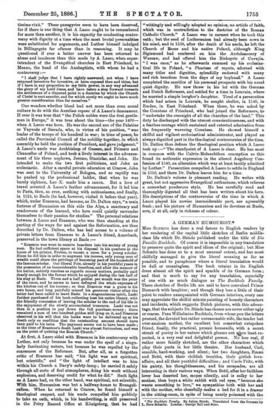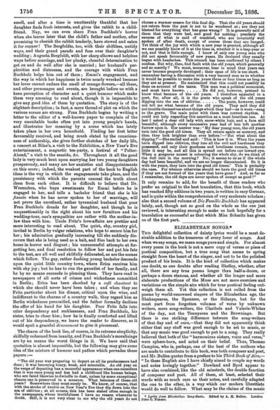A GERMAN HUMOITRIST.* MISS SCHMITZ has done a real favour
to English readers by her rendering of the capital little sketches of Berlin middle- class life which Dr. Stinde published under the title of Die Familie Buchholz. Of course it is impossible in any translation to preserve quite the spirit and idiom of the original ; but Miss Schmitz has done so to a most unusual extent, and has most skilfully managed to give the literal meaning as far as possible, and to paraphrase where a literal translation would be dull or meaningless. The book retains in its English dress almost all the spirit and sparkle of its German form ; and that is much to say for any translation, especially of one with as much dialogue as The Buchholz Family. These sketches of Berlin life are said to have convulsed Prince Bismarck with laughter ; and though they lose a little of their point to readers unacquainted with German interiors, every one may appreciate the skilful minute painting of homely characters and incidents, which suggests Dutch pictures, with this advan- tage, that the subjects Dr. Stinde has chosen are never either ugly or coarse. Frau liVilhelmine Buchholz, from whose pen the letters proceed, the devoted but rather unreasonable wife, the tender but over-anxious mother, the excellent but somewhat outspoken friend, finally, the practical, prosaic housewife, with a secret streak of poetry in her nature which gleams out liken least ex- pected, is a very real and delightful person. No less real, if rather more faintly sketched, are the other characters which play their parts in her little theatre. Her husband, Carl, sensible, hard-working, and silent ; her two daughters, Emmi and Betti, with their childish troubles, their girlish love- affairs, and all their youthful difficulties ; and Uncle Fritz, with his gaiety, his thoughtlessness, and his escapades, are all interesting in their various ways. When Betti, after her faithless lover has deserted her, mopes silently, and is sulky to her mother, then buys a white rabbit with red eyes, "because she wants something to love," we sympathise both with her and with the mother, who cheerfully makes a bed for it in a drawer in the sitting-room, in spite of being nearly poisoned with the
• The Buchholz Family. By Julius Stinde. Translated from the German by L. Dora Schmitz. Loudon George Bell and Bons,
smell, and after a time is unutterably thankful that her daughter finds fresh interests, and gives the rabbit to a child- friend. Nay, we can even share Frau Bachholz's horror when she learns later that the child's father and mother, after promising to cherish the rabbit tenderly, have stewed and eaten it for supper ! The Bergfeldts, too, with their shiftless, untidy ways, and their grand parade and fuss over their daughter's wedding ; Augusta Bergfeldt, with her sharp elbows and helpless ways before marriage, and her plucky, cheerful determination to get on and do well after she is married ; her husband's per- plexities and distresses, and the courage with which Frau Buchholz helps him out of them ; Emmi's engagement, and the way in which her happiness is twice nearly wrecked because her lover cannot endure the smell of orange-flowers,—all these, and other personages and events, are brought before us with a keen perception of character and a quiet humour which make them very amusing to read about, though it is impossible to give any good idea of them by quotation. The story is of the
slightest description ; in fact, a mere thread of plot OR which the various scenes are strung. Fran Buchholz begins by writing a letter to the editor of a well-known paper to complain of the very unsuitable books often put into young people's hands, and illustrates her meaning by a scene which has lately
taken place in her own household. Finding her first letter favourably received, and being much elated by the conscious- ness of authorship, she gives farther sketches of her daily life, a concert at Bilse's, a visit to the Exhibition, a New Year's Eve entertainment, a magnetic tea-party, a festival of " Polter- Abend," a visit to the seaside, &c. Throughout it all the good lady is very much bent upon marrying her two young daughters prosperously, and many are her anxieties and disappointments on this score ; indeed, the weakest part of the book to English ideas is the way in which the engagements take place, and the persistency with which the parents conceal the truth about them from each other. It is difficult to believe that Dr. Wrenzchen, who buys sweetmeats for Emmi before he is engaged to her, and tells a bachelor friend that she is his fiancee when he has never spoken to her of marriage, will not prove the unrefined, rather tyrannical husband that poor Frau Buchholz dreads for her daughter, and though he is unquestionably in the right about his new furniture and his wedding-tour, one's sympathies are rather with the mother-in- law than with him. Uncle Fritz's love-affairs are prettier and more interesting to read about. The quiet, shy, country girl, invited to Berlin by vulgar relations, who hope to secure him for her ; his admiration gradually increasing till she suddenly dis- covers that she is being used as a bait, and flies back to her own home in horror and disgust ; his unsuccessful attempts at for- getting her, and final resolution to follow her and put his fate to the test, are all well and skilfully delineated, as are the scenes which follow. The gay, rather dashing young bachelor descends upon the quiet little country town, where Erica receives him with shy joy ; but he has to run the gauntlet of her family, and he by no means succeeds in pleasing them. They have read in newspapers of all sorts of crimes and wickedness committed in Berlin ; Erica has been shocked by a cafe chantant to which she should never have been taken ; and when they see Fritz particular about his dinner, critical upon the wine, and indifferent to the charms of a country walk, they regard him as Berlin wickedness personified, and the father formally declines the offer of his hand for his daughter. Poor Fritz falls into utter despondency and recklessness, and Fran Buchholz, his sister, tries to cheer him ; how he is finally comforted and lifted out of his despondency, we leave the reader to discover, as it would spoil a graceful denouement to give it piecemeal.
The charm of the book lies, of course, in its extreme simplicity, skilfully redeemed from inanity, and Fran Buchholz's moralisings are by no means the worst things in it. We have said that quotation is almost impossible, but the following may give some idea of the mixture of humour and pathos which pervades these papers :—
" The old year was preparing to depart as all its predecessors had done ; it was becoming hoary, weak, and miserable. An old year on the verge of departing has a mournful appearance when one considers that it was once young and has had a childhood like human beings, who are fated likewise to dwindle to dust, unless by some exceptional chance one is preserved in a museum. What beeomes of these old years ? Somewhere they must surely be. We know, of course, that with the stroke of twelve on New Year's Eve they dip down into the sea of oblivion ; at all events, this has been stated often enough in the newspapers, whose truthfulness I have no reason whatever to doubt. Still, it is not very clear to me why the old years do not choose a warmer season for this final dip. That the old years should not return from the past is not to be wondered at ; are they not blamed for everything that has gone wrong ? It is generally said of them that they were bad, and good for nothing : precisely the reverse of what is said of mankind, who are invariably well spoken of after death, except of course those that are banged. Yet think of the joy with which a new year is greeted, although all we can possibly know of it at the time is, whether it is a leap-year or not, and that is little enough. I know of only one young man who did not speak favourably of new years. He declared they usually began with headaches. This remark has been confirmed by others I confess. But why, then, find fault with the old years, which generally end so merrily ? We must, moreover, bear in mind that years can never become properly developed ; their span of life is too short. I remember having a discussion with a very learned man as to whether it would be possible to make the years three or four times as long as they are at present. He maintained that this could not possibly be done on account of the taxes. This man was a political economist, and must have known He did not, however, pretend to know what became of the old years. I therefore appealed to a poet, for, after all, it is the poets who speak of the old years dipping into the sea of oblivion The poets, however, could not tell me what became of the old years. They said they did not trouble themselves about things which they had—as it were—sang to the grave. The main point with them was correct rhythm. I could not help regarding this assertion as a most heartless one. At last I asked a dear old lady with snow-white hair, and a face still beautiful, although every successive year had of late left another farrow upon it Her answer was : My dear young man, the old years turn into the good old times. They all return again as memory, and then they look brighter than ever before.'—' But what about the dipping P'—She smiled and said : This is how it is. When the years have dipped into oblivion, they lose all the evil and harshness they possessed, and only their goodness and loveliness remain, however little it may be, and all this is spread out before our inward eye. When a gorgeous sunset is colouring the whole sky, do we think of the dull rain in the morning ? No; it seems to us as if the whole day had been beautiful, and we are no longer discontented. So it is with the years, they turn into the good old times.' This is probably the case. For whence otherwise should we have the good old times if they are not formed of the years that have gone ? And, as far as I remember, the old days are never spoken of except as good !"
It only remains to add, for the benefit of those readers who prefer an original to the best translation, that this book, which has reached fifty editions in two years, is written in easy German, and is quite within the comprehension of very moderate scholars ; also that a second volume of Die Familie Buchholz has appeared lately, and, though not so good on the whole as the one just reviewed, is interesting enough to make us look hopefully for a translation as successful as that which Miss Schmitz has given us of the first part.



































 Previous page
Previous page